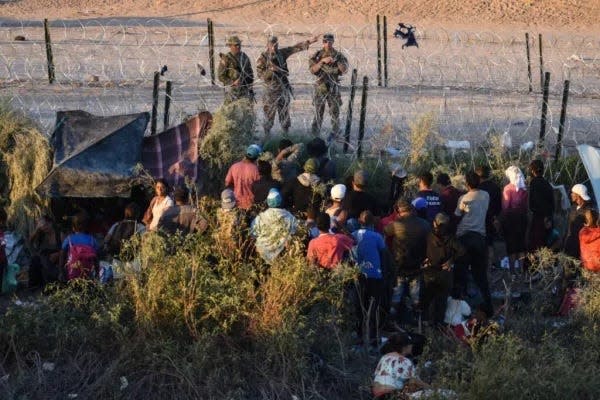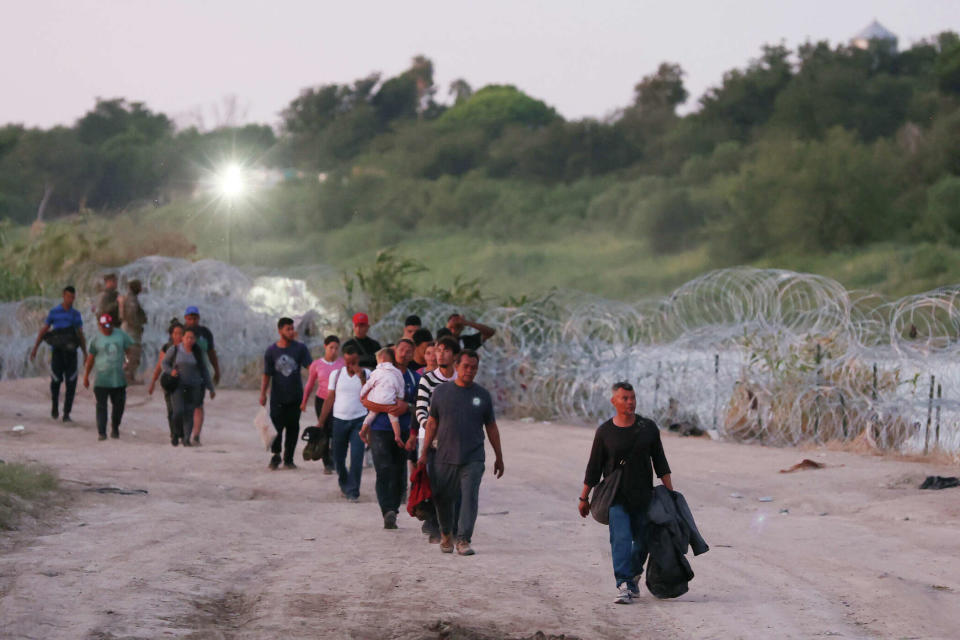Migrants are arriving in RI from Mexican border but not from the countries you might think
PROVIDENCE – A recent influx of migrants arriving in Rhode Island from the southern border has left a city nonprofit agency in need of more resources for those it serves.
On a recent Monday afternoon, the lobby of the Refugee Dream Center was packed with new arrivals. Caseworkers are asked to offer rides to clients without the money for bus passes. Finding shelter for people is a balancing act. Day-to-day survival is the goal for many.
The Refugee Dream Center is known for helping new arrivals settle in the state and become self-reliant. But the organization's director and co-founder, Teddi Jallow, said that it's become tough to provide everything needed as demand has increased.
From July into September, Jallow said about 50 migrants arrived in the state by plane from the southern border. Yet they come from a wide array of countries, including Afghanistan, Senegal and the Congo, as well as Guatemala, Mexico and Honduras.
Migrants from Afghanistan and African countries have been attempting to make it into the U.S. through that border, along with those from Mexico and the Northern Triangle.
"My fear is we are seeing more migrants from the border and nobody is talking about it," Jallow said.
Jallow said previously she might have seen only one migrant per month – not counting the many refugees the center has served. Being deemed a refugee is a legal process that involves a lawyer and court proceedings required to gain asylum as a person who was persecuted or in mortal danger in their home country.
Yet based on the stories of the new arrivals, they may qualify for asylum – if they could afford a lawyer. Jallow says at an average starting cost of $7,000, a lawyer is too expensive for the agency to provide.

Where are the migrants from and why are they leaving home?
The Providence Journal met and interviewed three migrants who described living in countries that made life unbearable or even potentially deadly. Their names are not being used in this story to protect their privacy and safety.
Each arrived recently, with one man from Senegal making his way into Rhode Island only on Sunday. He traveled through Morocco, Spain, El Salvador, Nicaragua and Mexico before entering the U.S. It took him 15 days total, he said, to get to the southern border before he boarded a flight into the country.
He described leaving because of political upheaval. Over the summer, the government detained Ousmane Sonko, the leader of the country's primary opposition party, charging him with fomenting insurrection. The party was dissolved and protests erupted.
The man with whom the Journal spoke said he was part of the protests.
"A lot of my colleagues went to jail," he said. "Some are dead. So that's why I left."
Another man, who came from Afghanistan, told The Journal he arrived in Rhode Island in mid-September after spending eight days in a refugee camp near the southern border. His journey took him through a dozen countries – a trip on which he embarked in January via Iran. He now lives with a friend.
A third man came from Mauritania, also traveling through a handful of countries to get to the southern border. He told The Journal he left because of Mauritania's ongoing use of slavery. The man said he was treated as a slave and owned nothing. According to the United Nations, slavery still has a grip on the country, which has not enforced its anti-slavery law.
Now that these three men are in Rhode Island, life has become about surviving from day to day.
"These men are just sitting here doing nothing," Jallow said of the new arrivals. "Some of them are even homeless."

What is Rhode Island doing to help the migrants coming from the southern border?
Department of Human Services spokesman Jose Garcia said Gov. Dan McKee's deputy chief of staff, Christopher Abhulime, met with the state refugee coordinator, Baha Sadr, last week to discuss the arrival of migrants.
"People have been arriving in Rhode Island on their own for many years," Garcia said. "Based on what the state has seen, there is no coordinated effort to bring migrants to Rhode Island and the vast majority seen coming into the state come here because they have friends and family in Rhode Island. When DHS is informed of needs like the one raised by the Refugee Dream Center, the agency provides assistance by helping connect migrants with private resources."
Garcia said those resources include emergency funds, food and clothing. But the 50 migrants Jallow referenced "are not currently eligible for public benefits due to their immigration status," Garcia explained.
Garcia added that the migrants may be able to receive work authorization documents if they apply for asylum.
End of free RIPTA bus line has unearthed new struggle for migrants
At the Refugee Dream Center, Noorulhaq Sadeqi, a caseworker who helped translate for the man from Afghanistan, was at the same time being asked by two migrants in downtown Providence to offer them a lift, as many don't have bus passes.
The Rhode Island Public Transit Authority piloted a one-year free-fare program on its popular R-line, but that expired at the end of September, leaving clients with no transportation save for rides from friends.
More: From fiscal cliffs to free fares — what is the future of RIPTA?
Jallow said she had to ask a caseworker at one point to drive a Mauritanian mother of six home to Pawtucket, but Jallow can't always ask that of her staff, which needs to be available to deal with new cases. Occupied seats in the lobby illustrated that point.
Sadeqi said providing for these migrants and refugees is a matter of human rights.
"They're all humans," he said.
This article originally appeared on The Providence Journal: More migrants in RI from southern border – what's being done to help

